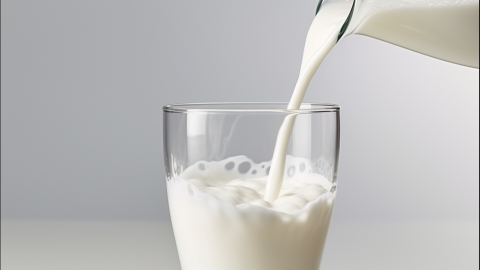What happens if you drink too much whole milk?
Generally, excessive consumption of pure milk can impose multiple burdens on the body and cause discomfort, mainly including gastrointestinal discomfort, increased kidney burden, interference with the absorption of other nutrients, weight gain, and induction of lactose intolerance symptoms. A detailed analysis is as follows:

1. Gastrointestinal discomfort: Pure milk contains a relatively high amount of protein and fat. Excessive consumption can increase the digestive burden on the stomach and intestines. Some individuals may experience symptoms such as bloating, abdominal pain, and belching. This is especially true for those with weak gastrointestinal function, as insufficient secretion of digestive enzymes may prevent timely breakdown of nutrients in milk.
2. Increased kidney burden: Pure milk is rich in protein and calcium, substances that must be metabolized and excreted by the kidneys. Long-term excessive consumption may keep the kidneys in a state of high workload, increasing metabolic stress. For individuals with pre-existing kidney insufficiency, this may further impair normal kidney function.
3. Interference with the absorption of other nutrients: Excessive intake of pure milk occupies space in the gastrointestinal tract, affecting the consumption of other foods and subsequently leading to inadequate absorption of nutrients such as dietary fiber and vitamin C. Prolonged overconsumption may result in a monotonous diet structure, causing nutritional imbalances and affecting normal physiological functions of the body.
4. Weight gain: Pure milk contains a certain amount of calories. If consumed excessively over a long period without sufficient physical activity to expend the extra calories, they may be converted into fat and stored in the body, gradually leading to weight gain and potentially increasing the risk of obesity over time.
5. Induction of lactose intolerance symptoms: Some individuals have insufficient secretion of lactase. When consuming excessive amounts of pure milk, lactose cannot be adequately broken down and may ferment in the intestines, producing gas and causing symptoms such as bloating, diarrhea, and abdominal pain associated with lactose intolerance.
When consuming pure milk daily, one should follow the principle of moderation. Adults are advised to consume 300–500 grams per day, while children and adolescents can adjust the amount according to their growth needs. It is also important to consider individual digestive capacity and health status, appropriately managing intake to avoid excessive and indiscriminate consumption, thereby ensuring nutritional balance and reducing physical strain.







